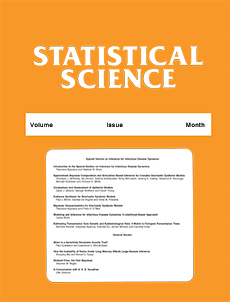Abstract
We consider the Bayesian analysis of a few complex, high-dimensional models and show that intuitive priors, which are not tailored to the fine details of the model and the estimated parameters, produce estimators which perform poorly in situations in which good, simple frequentist estimators exist. The models we consider are: stratified sampling, the partial linear model, linear and quadratic functionals of white noise and estimation with stopping times. We present a strong version of Doob’s consistency theorem which demonstrates that the existence of a uniformly $\sqrt{n}$-consistent estimator ensures that the Bayes posterior is $\sqrt{n}$-consistent for values of the parameter in subsets of prior probability 1. We also demonstrate that it is, at least, in principle, possible to construct Bayes priors giving both global and local minimax rates, using a suitable combination of loss functions. We argue that there is no contradiction in these apparently conflicting findings.
Citation
Y. Ritov. P. J. Bickel. A. C. Gamst. B. J. K. Kleijn. "The Bayesian Analysis of Complex, High-Dimensional Models: Can It Be CODA?." Statist. Sci. 29 (4) 619 - 639, November 2014. https://doi.org/10.1214/14-STS483
Information





